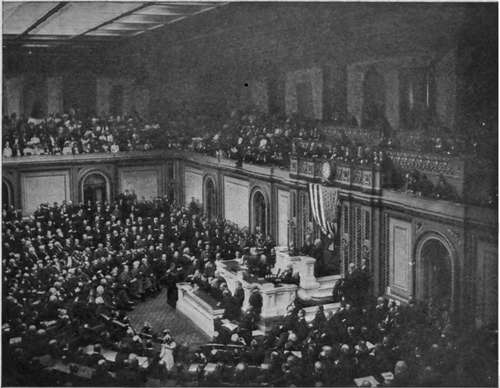Princes At The Capitol
Description
This section is from the book "The National Capitol. Its Architecture Art And History", by George C. Hazelton, Jr. Also available from Amazon: The National Capitol Its Architecture Art and History.
Princes At The Capitol
When the Prince of Wales, since King Edward VII., visited Washington in October, i860, he made a tour of the Capitol, and, curiously enough, passed over ground and within walls which the English had captured when they burned the building in 1814. Kinahan Cornwallis gives the following account of the few minutes spent by the Prince in the Capitol: " The Prince, accompanied by Lord Lyons, Secretary Floyd and others, drove up to the eastern front of the Capitol, where he was received by the architect and chief engineer of the works, and by them conducted over the building. First they visited the library, from which they passed by a private staircase to the Senate Chamber and the committee rooms, and thence to the rotunda, where the beautiful paintings hung round its magnificent interior attracted their especial attention. The history of Pocahontas was inquired into, and even the ' Surrender of Lord Cornwallis1 became a theme of pleasant conversation.

Mckinley memorial service.
From this they proceeded through the old hall of the House of Representatives to the new Hall of the House, where the sides occupied by the administration and opposition members were pointed out, and much general information afforded in answer to their queries. The Speaker's room was next entered, then the Agricultural and other rooms, the Naval and Military Committee apartments and offices of the Senate. The party then viewed the Capitol grounds from the portico of the east front, and, descending the steps after half an hour's stay, drove back to the White House".
Prince Henry of Prussia visited the Capitol on the 24th of February, 1902, under the eyes of the applauding populace, who filled the plaza and every coign of vantage in the building. The Prince, who was accompanied by the German Ambassador, his suite and Rear Admiral Evans, was received on the eastern portico by a committee of the House of Representatives. During a moment's delay in the rotunda, incident to .the arrival of General Corbin and some members of " His Highness's " suite, who followed, the Prince's eye was caught by the paintings of " The Discovery of the Mississippi" and " The Baptism of Pocahontas." The visitor was cheered loudly by the people in the rotunda, who were held at bay by a rope stretched across the great circle. The party then proceeded through Statuary Hall and on through the corridors by the rooms of the Military Affairs and Ways and Means Committees to the Speaker's room, where the Prince was received by Speaker Henderson, with a truly democratic handshake and a short address of welcome. Some say the Speaker began his greeting by referring to the friendly feelings existing between the Prince's " republic " and oursóbut, seeing his error, quickly and diplomatically changed the word " republic " to " nation".
The Prince was next escorted into the gallery of the House, where he sat an interested spectator for some minutes. When he appeared in the gallery door, he was cheered to the echo, not only by the occupants of the galleries, but by the Representatives of the forty-five States. It was hearty if not dignified, and must have impressed " His Highness" with a spirit of gratitude. As he took his departure, he was accorded a second rousing cheer from all in the chamber. He turned and bowed his acknowledgments. A brief reception was then held in the Ways and Means Committee room, where the Prince graciously accepted the inevitable and shook hands American fashion with one and all.
Later, on the arm of Senator Cullom, who headed a committee of the Senate, appointed to do him honor, the Prince passed through the building to the north wing, to be received by the more conservative body of Congress. The Prince's suite were escorted to the diplomatic gallery by General Corbin, but the Prince himself and the German Ambassador were taken directly into the Senate Chamber. Here Senator Frye, the President pro tempore of the body, accorded the royal visitor a seat of honor next the President's chair. As the Prince entered the Chamber, an exciting debate was in progress as to whether the two Senators from South Carolina, who were in contempt of the Senate, should be permitted to vote on the Philippine bill. The Senators arose in a body, however, out of respect to " His Highness," as he was conducted down the aisle and to his seat. The Prince became so interested that he did not depart until a word from the Ambassador, sitting at the Clerk's desk below, indicated that it was opportune. The Prince thanked Senator Frye, who momentarily stopped the debate with his gavel, and passed out, bowing his acknowledgments to the Senators right and left, who again respectfully arose in their seats. The continuance of the debate prevented a reception being held as had been planned. As " His Highness" passed from the Chamber, the gallery broke into applause.
Continue to:
